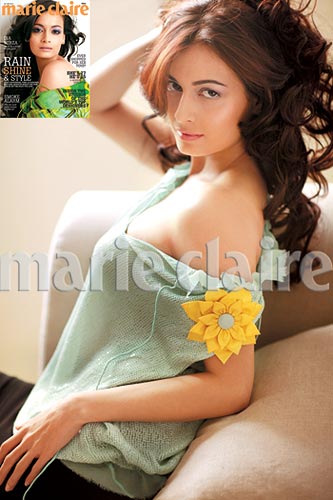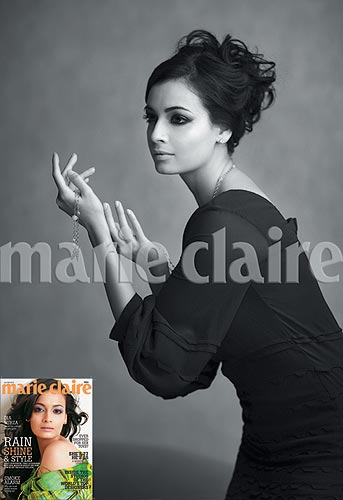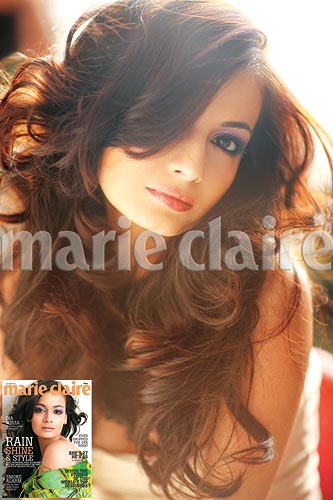 | « Back to article | Print this article |
Dia Mirza:The Butterfly Effect
Half a dozen movies in the making and a plethora of off-beat roles, Dia Mirza is all set to give her filmy career a push in the right direction. And for those who thought she was just a pretty face, the sensual, stunning actress is determined to prove her prowess.
Something as small as the flutter of a butterfly's wing can ultimately cause a typhoon halfway around the world. Chaos Theory.
Dia Mirza could have been a butterfly -- she's out with six new films that are creating quite a flutter, there's a skip in her stride as she flits from point to point in our conversation, and there is an effortlessness to her body language as she holds onto a lime green Roberto Cavalli dress. But before you can build up the pretty picture in your head, she stops to tell you that she's not looking forward to the butterfly stage in her life.
"It's nicer to be a caterpillar. The butterfly's life-span is only a day and I'm in no hurry to get there," she says, breaking out into peals of laughter. Intelligent. Easy. Honest. Who else confirms in full public view that they'd rather stay a caterpillar all their life? But such is the charm of Dia. She doesn't realise that no matter how much she resists, she's breaking out in vibrant colours, her forthcoming films guaranteed to bring back variety into starved multiplexes.
The evolution of Dia hasn't been an easy one, personally and professionally. Her personality is largely sketched by her own childhood experiences. "My parents divorced when I was five. Like any child, it was difficult for me to accept that. But it shaped my outlook towards life. Then my father passed away when I was nine; that was probably the toughest phase of my life," she recounts.
Pain, like everything else, shaped her destiny but Dia isn't one to forget the lessons her dad taught her. "One day, when I was five, my dad saw me upset. He took me to the room and showed me an atlas, pointed out the world, the continents, the countries, states and finally, the cities. Hyderabad seemed like a dot. It was then that he explained to me that we are all small, probably inconsequential in the larger scheme of things, and we should look at everything from a higher point of view. It was then that I understood my parent's separation. I understood that two people can be perfect human beings and can love each other, but that doesn't necessarily mean that they can live with each other," she narrates carefully, looking to deliver an insight.
Growing up in Hyderabad was 'good fun', and Dia took to modelling at the age of 15. A group of shoots followed and she was offered a spot on the Miss India pageant. And from then on there has been no looking back for Dia.
"Miss India was a paradigm shift in my life. It empowered me because I was able to make the kind of financial choices that I wanted for my life. Even otherwise, my mother would insist that I ought to always be self-sufficient and if ever I was marooned on an island, I should be able to build my own house, cook my own food, and manage everything without any outside help," she says, of the bygone days.
Dia Mirza:The Butterfly Effect
On a personal level, Dia is single; her very public relationships are a part of her past now. She understands the choices she makes in her life, and is glad her views on marriage have not changed with the choices her parents made. She is a sucker for romance. "My parents didn't thrust the relationship on each other just because they had me. I'm a great believer in the institution of marriage," she admits, which brings us to the age-old dating debate. For which Dia smiles that "she will be single till the day she gets married".
"The next man in my life will be the one I will marry. I don't want a relationship, I don't want a reason or a season, and I want a lifetime now," she says, almost determinedly. Very clear, very articulate and very warm, Dia has continuously been evolving into the person she wants to be. "I came here with nothing, and I am immensely grateful for what I have got. I am ambitious, but my ambition is not related to what someone else is doing. My drive and zest is to outdo myself, no one else," she asserts, carefully weeding out negativity and comparisons in an industry saturated with petty jealousies among Miss Indias. And like that small flutter of the butterfly, she's waiting to move mountains. Something as small as the flutter of a butterfly's wing can ultimately cause a typhoon halfway around the world. Chaos Theory
Dia Mirza could have been a butterfly she's out with six new films that are creating quite a flutter, there's a skip in her stride as she flits from point to point in our conversation, and there is an effortlessness to her body language as she holds onto a lime green Roberto Cavalli dress. But before you can build up the pretty picture in your head, she stops to tell you that she's not looking forward to the butterfly stage in her life.
"It's nicer to be a caterpillar. The butterfly's life-span is only a day and I'm in no hurry to get there," she says, breaking out into peals of laughter. Intelligent. Easy. Honest. Who else confirms in full public view that they'd rather stay a caterpillar all their life? But such is the charm of Dia. She doesn't realise that no matter how much she resists, she's breaking out in vibrant colours, her forthcoming films guaranteed to bring back variety into starved multiplexes.
There's Kaun Bola with Arshad Warsi, where she plays a hot-shot fashion editor, and Acid Factory, an action thriller where she stars alongside six male co-stars. Kisaan, based on farmer suicides, and Johnny Mastana with Renzil D'Silva are her other offerings while Alibaug, a romantic drama that's "very close to her heart" is based on her all-time favourite book, Tuesdays with Morrie. And then, there's Fruit and Nut, a madhouse comedy where she's paired with Cyrus Broacha and Boman Irani.
The movies boast of a clear and audible shift in her acting agenda. They're off-beat, different, and they clearly outline the death of the damsel in distress, a role that Dia repeatedly played in the last few years. Right from her debut with Rehna Hai Tere Dil Mein to a cluster of average films like Tumsa Nahin Dekha and Deewanapan to popular ones like Parineeta and more recently, Honeymoon Travels Pvt Ltd, Dia's subtle yet engaging performances were applauded, but the A-list was a dream. The year 2009, though, is being crafted as her year, and she's towering up with a new-found poise.
"The film industry was a very meandering path for me. It takes time to get a foothold in an industry that you're not born into. But I think I've found my own niche, my place," she says.
Dia Mirza:The Butterfly Effect
The evolution of Dia hasn't been an easy one, personally and professionally. Her personality is largely sketched by her own childhood experiences.
"My parents divorced when I was five. Like any child, it was difficult for me to accept that. But it shaped my outlook towards life. Then my father passed away when I was nine; that was probably the toughest phase of my life," she recounts. Pain, like everything else, shaped her destiny but Dia isn't one to forget the lessons her dad taught her.
"One day, when I was five, my dad saw me upset. He took me to the room and showed me an atlas, pointed out the world, the continents, the countries, states and finally, the cities. Hyderabad seemed like a dot. It was then that he explained to me that we are all small, probably inconsequential in the larger scheme of things, and we should look at everything from a higher point of view. It was then that I understood my parent's separation. I understood that two people can be perfect human beings and can love each other, but that doesn't necessarily mean that they can live with each other," she narrates carefully, looking to deliver an insight.
Growing up in Hyderabad was 'good fun', and Dia took to modelling at the age of 15. A group of shoots followed and she was offered a spot on the Miss India pageant. And from then on there has been no looking back for Dia. "Miss India was a paradigm shift in my life. It empowered me because I was able to make the kind of financial choices that I wanted for my life. Even otherwise, my mother would insist that I ought to always be self-sufficient and if ever I was marooned on an island, I should be able to build my own house, cook my own food, and manage everything without any outside help," she says, of the bygone days.
Turning over to the material side of things, Dia admits that she's a shopping geek. Shantanu & Nikhil, Tarun Tahiliani, Shahab Durazi and Rocky S are some Indian designers she patronises, while internationally, Valentino and Dolce & Gabbana are her all-time favourites. "I'm not the high-end buyer. I feel guilty when I wear or buy expensive stuff. It inherently comes from the fact that I live in India and the disparity bothers me. You should be able to buy something and enjoy it without having the label define you. I'll buy a Prada once in a while, but a Prada doesn't define me," she says of her choices.
On a personal level, Dia is single; her very public relationships are a part of her past now. She understands the choices she makes in her life, and is glad her views on marriage have not changed with the choices her parents made. She is a sucker for romance.
"My parents didn't thrust the relationship on each other just because they had me. I'm a great believer in the institution of marriage," she admits, which brings us to the age-old dating debate. For which Dia smiles that "she will be single till the day she gets married". "The next man in my life will be the one I will marry. I don't want a relationship, I don't want a reason or a season, and I want a lifetime now," she says, almost determinedly. Very clear, very articulate and very warm, Dia has continuously been evolving into the person she wants to be. "I came here with nothing, and I am immensely grateful for what I have got. I am ambitious, but my ambition is not related to what someone else is doing. My drive and zest is to outdo myself, no one else," she asserts, carefully weeding out negativity and comparisons in an industry saturated with petty jealousies among Miss Indias. And like that small flutter of the butterfly, she's waiting to move mountains.



